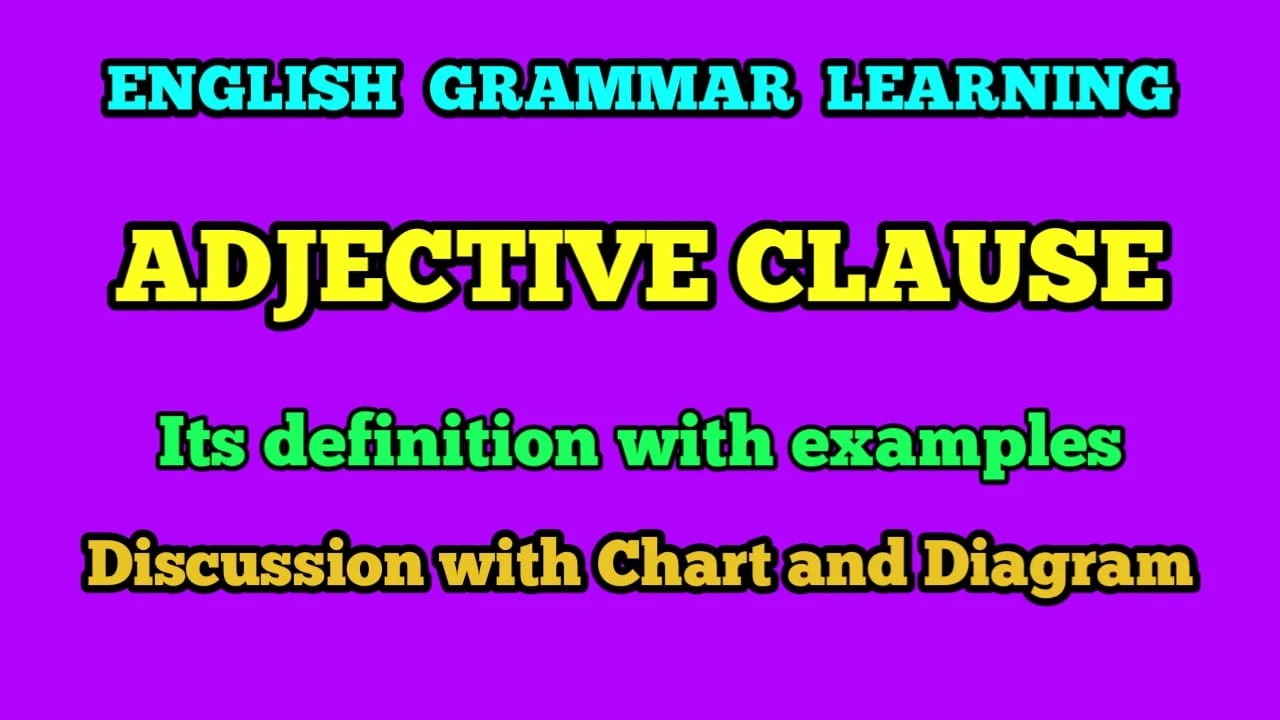Adjective Clause Examples and Answers are given here for understanding how to identify adjective clauses in a sentence. Adjective Clause Examples and Answers will help to join sentences into complex sentence. This article will provide adjectival clause examples and functions.
Adjective Clause Definition
When a subordinate clause does the work of an adjective to some noun or pronoun in some other clause, it is called an Adjective Clause.
Example: I know the boy who has done it.
“I know the boy who has done it.” – In this sentence, the clause “who has done it” describes the noun “the boy”. So, this clause does the work of an adjective. It is an Adjective Clause.
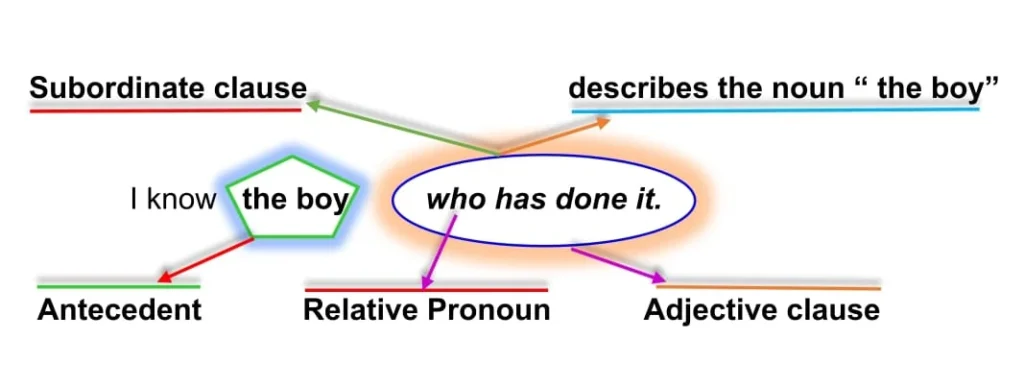
Adjective Clause Examples and answers in Sentences
(a) She told me the address that I wrote down on a piece of paper.
(b) The man who answered the phone, told me that you were out.
(c) I saw a car which was rushing past the park.
(d) He is a soldier who must show discipline.
(e) Do you know the place where Vidyasagar was born?
(g) Here is the pencil that You lost yesterday.
(h) Listen to those things what teachers say.
(i) The man whom you saw the other day is Mr. Das’ nephew.
(j) Messi who got the golden boot was in the Argentina team.
(k) He gave me his textbooks which did me much good.
People also ask
How do you identify an adjective clause in a sentence?
(i) First, find out the linker or connector in the sentence.
(ii) If the linker or the connector is followed by a ‘noun‘ or a ‘pronoun‘, the subordinate clause does the work of an adjective. Then the subordinate clause will be an Adjective clause or relative clause.
(iii) “The Noun” or “The Pronoun” to which the connectors or the linkers refer, is called ‘Antecedent’.
(iv) If there is no Antecedent of ‘which‘, ‘what‘, ‘why‘, ‘when’, ‘where’, ‘why‘, ‘that’, ‘how‘, or ‘whose‘, – it will be a Noun Clause.
(v) If there is an Antecedent before ‘which‘, ‘what‘, ‘why‘, ‘when’, ‘where’, ‘why‘, ‘that’, ‘how‘, or ‘whose‘, – it will be an Adjective or Relative Clause.
(vi) The relative pronoun takes the number, person, or gender of its Antecedent.
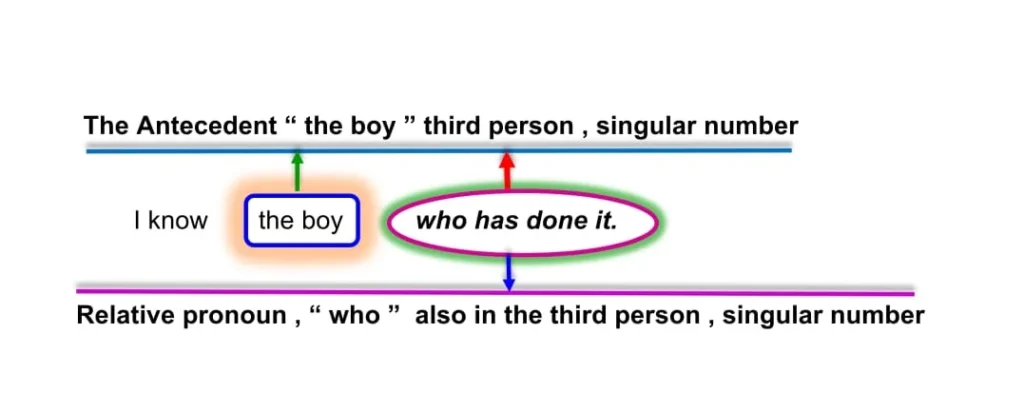
Linkers or Connectives of Adjective Clause:
There are two types of linkers or connectors used to join two or more simple sentences with an adjective clause.
Relative Pronouns: who, which, that, whom, whose.
Relative Adverbs: when, where, why, how.
Adjective Clause Examples and answers joined by relative pronouns, which, whom,
Which: This is the pen which I lost yesterday.
Whom: She is my mother whom I love most.
Which: Have you read the book which I gave you?
Adjective Clause Examples and answers joined by relative adverbs, when, where, why
When: I know the time when the train will arrive.
Where: This is the place where he was born.
Why: He told me the reason why he did not attend the meeting.
Why is an Adjective Clause called a Relative Clause?
An Adjective Clause is joined by a relative pronoun or relative adverb that relates to its Antecedent, So, Adjective Clause is often called Relative Clause.
What is Complex with an Adjective Clause with Examples?
A complex sentence contains only one Principal clause and one or more Subordinate clauses. When the subordinate clause in a complex sentence does the work of an adjective, this is called a complex sentence with an adjective clause.
Examples:
(I) The girl who is a friend of mine is a good basketball player.
(ii) Mr. Dilip Roy is my uncle whom You saw yesterday.
(iii) A boy who came to me yesterday is my classmate.
(iv) Some frogs which frogs generally live in trees can fly.
(v)The swallow that was going to die bade goodbye to the Happy Prince.
(vi) I am familiar with the boy who from class X bagged many prizes.
(vii) Something bright that was moving across the sky was like a star.
(viii) Rabindranath Tagore was a great poet whom we hold in high esteem.
(ix) The police are trying to identify the body that was found last week.
(x) I went to see the doctor who told me to take rest for a few days.
(xi) Coal that is found in Bengal is a very useful mineral.
(xii) The little boy whom the Giant loved most was never seen.
(xiii) The gallery that holds only one thousand people was crowded.
Difference between the Noun Clause and Relative Clause:
| Adjective or Relative Clause | Noun Clause |
| Begin with Relative Pronoun or Relative Adverb : who , which , what , why , when , where ,why . | Begin with Interrogative Pronoun or Interrogative Adverb : who , which , what , why , when , where why . |
| Must have Antecedent of who, which , what , why , when , where why . | No Antecedent of who, which , what , why , when , where why . |
| I know the boy who did it. | Tell me who did it. |
| Tell me the place where he lives. | Tell me where he lives. |
| I know the time when he will arrive. | I know when he will arrive. |
| I know the reason why he was absent. | I know why he was absent. |
| You know the process of how I did it. | You know how I did it. |
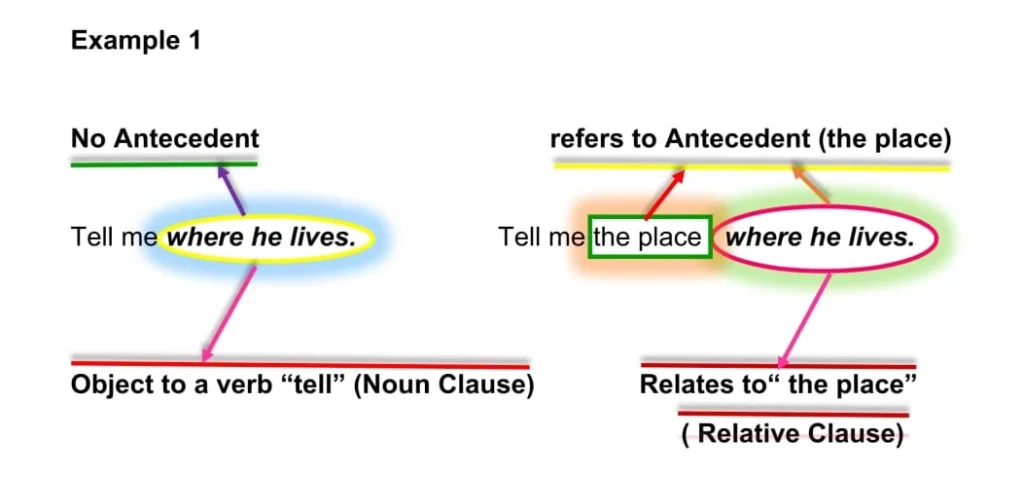
Restrictive & Continuative Adjective clauses with examples.
(i)The clause introduced by who, which, when, where, etc. may be a defining (or restrictive ) or non-defining (continuative) Relative Clause.
(ii) If the clause defines the subject, the clause will be restrictive.
(iii) If the clause adds a fact to the sentence, the subject of which is sufficiently defined without it, the clause will be a non-restrictive (i.e. continuative) one.
(iv) Defining Clauses are Subordinate Clauses and Non-defining Clauses are Co-ordinate with the Main Clauses.
The following two sentences illustrate the difference between defining (restrictive) and on-defining (non-restrictive) Relative Clauses.
Example:
The pen which was lost has been found.
I bought the pen which was red in colour.
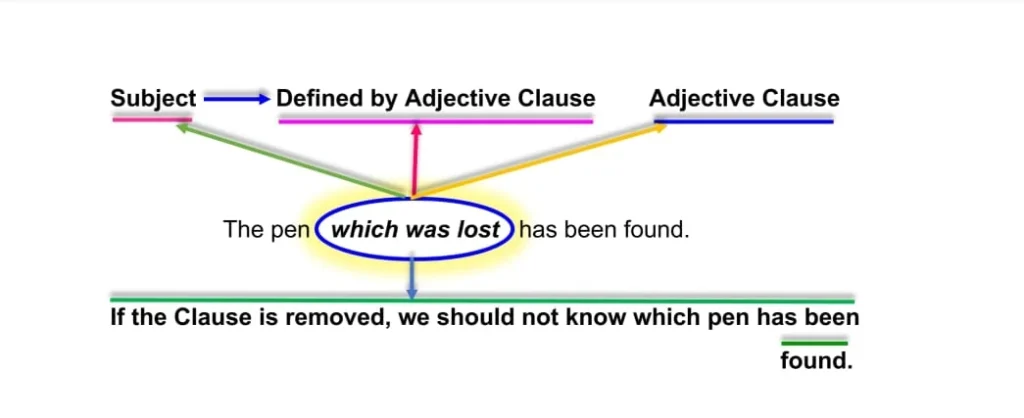
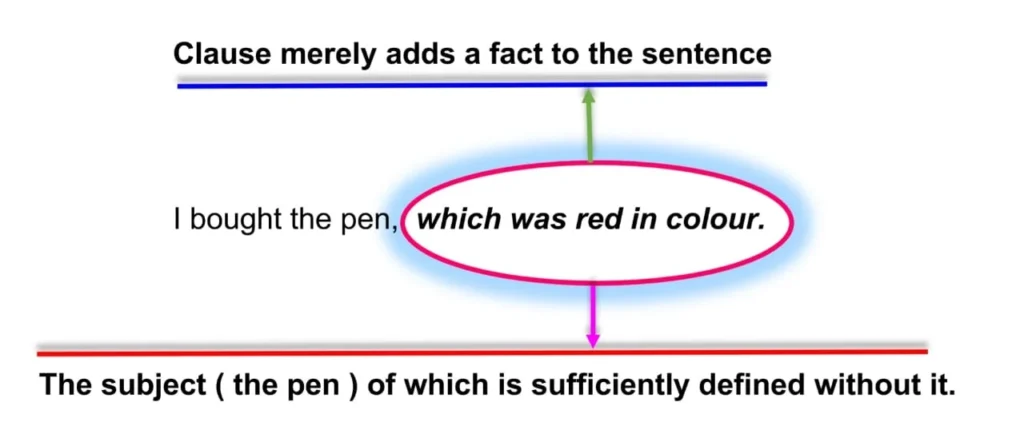
Examples of Restrictive and Continuative Clauses:
A. Defining (Restrictive) Clauses:
- The pen which/that was lost has been found.
- I know the boys who were absent.
- This is the place where he lives.
- He knows the time when Bina will come.
B. Non-defining (Continuative) Clauses:
- My horse, which ( = and it) is in the stable is an Arab.
- I saw my friend, who ( = and he) recognized me at once.
- She came to me yesterday, when ( and then ) I comforted her.
(i) A Non-restrictive clause generally takes a comma before it. The sentence containing such a Non-defining clause is compound. (ii) A Restrictive Clause may be introduced by “that” but a Continuative Clause is never introduced by “that”.
Omission or Relative Pronoun for Adjective Clause Examples:
(i) But the Relative Pronoun is often omitted, if it would have been in the Objective Case:
Example:
This is the man (whom) I saw.
I have forgotten the story (that) he told me.
But used as a Relative Pronoun:
(i) Adjective Clause are sometimes introduced by the Relative Pronoun “But”:
Example: There is none but wishes (who does not wish ) to be happy.
The sequence of Tense for Adjective Clause with Examples:
(i) The Tense of the verb in the Principal Clause does not affect that of the Relative Clause. Even the Past Tense in the Principal Clause may be followed by any Tense in the Relative :
Example:
(a) The teacher who teaches us English did not come to school yesterday.
(b) The drama which you are reading was written by Shakespeare.
(ii) When the dependent clause does the work of an adjective, any tense in the principal clause may be followed by any Tense in the dependent: Example given below .
| Principal Clause | Adjective Clause |
| I saw the man (Past Tense) | who does the work. (Present Tense) |
| I see the man(Present Tense) | who did the work. (Past tense) |
| I shall see the man(Future Tense) | who did the work. (Past tense) |
How to join two or more sentences with an adjective clause:
(a) I know the boy. He did it.
(b) This is the book. I bought it yesterday.
(i) Find out the common word or words from the above sentences.
In the above sentence “the boy” in a sentence (a) is the 1st common word and “He” is the 2nd common word. In sentence (b) “the book” is the 1st common word and “it” is the 2nd common word.
(ii) Write the 1st sentence up to the 1st common word.
Example:
(a) I know the boy……
(b)This is the book….
(ii) If the common words refer to “person”, “who” is to place after the 1st common word. If the common words refer to “thing”, “which/that” is to place after the 1st common word.
(a) I know the boy who ……
(b) This is the book which/that ……..
Example:
(iii) After that, write the 2nd sentence without the 2nd common word.
Example:
(a) I know the boy who did it.
(b) This is the book which/that I bought yesterday.
Exercises
A. Join the sentences with a Relative Clause.
[Use who, which, where, what, that, etc.]
(a) She told me the address. I wrote the address down on a piece of paper,
(b) The man answered the phone. He told me that you were out,
(c) I saw a car. It was rushing past the park,
(d) He is a soldier. He must show discipline,
(e) Where was Vidyasagar born? Do you know the place?
(g) Here is the pencil. You lost it yesterday.
(h) Teachers say something. Listen to those things,
(i) You saw the man the other day. He is Mr. Bose’s nephew.
(j) Romario got the gold football award. He was in the Brazil team.
(k) He gave me his textbooks. Those did me much good.
B. Join the following sentences with the Adjective clause.
(l) The girl is a friend of mine. She is a good basketball player.
(m) Mr. Dilip Roy is my uncle. You saw him yesterday.
(n) A boy came to me yesterday. He is my classmate.
(o) Some frogs can fly. Those frogs generally live-in trees.
(p) The swallow was going to die. He bade good-bye to the Happy Prince.
(q) It was the day of the prize-giving ceremony. A boy from class X bagged many prizes. I am familiar with the boy.
(r) Something bright was moving across the sky. It was like a star.
(s) Rabindranath Tagore was a great poet. We hold him in high esteem.
(t) A body was found last week. The police are trying to identify the body.
(u) I went to see the doctor. The doctor told me to take rest for a few days.
C. Make the following sentence into a complex sentence with an adjective clause.
(v) Coal is found in Bengal. It is a very useful mineral.
(w) The Giant loved a little boy the most. The boy was never seen again.
(x) The gallery was crowded. It holds only one thousand people.
(y) The boy passed the Final examination. He told me this.
(z) The house is under construction. It belongs to me.
(aa)This is the place. Rabindranath was born here.
(ab) The book is very useful. Samir bought it yesterday.
(ac) The doctors and nurses are all thoroughly trained men and women. Their main purpose is to help the patients to get well as quickly as possible.
D. First find out Adjective Clause and State whether the clauses introduced by “who”, “which”, “when”, and “where”,in the following sentences are Restrictive or Continuative:-
(1) I have seen the boy who stood first in the examination.
(2) My brother, who has seen you, will pardon you.
(3) The place where he was born has been washed away by the Padma.
(4)This is Calcutta where he was born.
(5) He failed, which is a mystery.
(6) I know your brother who is a pleader.
(7) I bought the horse which had won the race.
(8) I have bought a horse that will win the race.
(9) The girl lived in Dacca where she was a student.
(10) The girl went to the village where she had been a student.
(11) The girl lives in her native village where she is a student.
(12) I went to the boy, who promised to help me.
(13) I went to the boy who had promised to help me
(14) I know the place where he was born.
(15) Everybody loves a boy who speaks the truth.
(16) I know the time when he will arrive.
(17) The tree that stood in front of my house has been blown down.
(18) I want a pen that is made in India.
(19) A servant who is faithful always serves his master.
(20) The boys that will succeed will get prizes.
(21) Uneasy lies the head that wears a crown.
(22) The reason why he failed is known.
FAQ on Adjective Clause with Examples and Answers
What are the 10 examples of adjective clauses?
Ans:
(1) I was introduced to a man whom I had never seen before.
(2) This is the book which I lost yesterday.
(3)The farmers who were working in the field heard the boy’s cry.
(4) I have five dogs which guard my house at night.
(5) We reached the ashram where a monk was living with his disciples.
(6) I went down a footpath at the end of which there was a chasm.
(7) He had received good education which raised him above many men of his own.
(8) I have seen your brother who lives in Mumbai.
(9) He told me the reason why you are not keeping good health.
(10) That is the college where we read for five years.
How do you identify an adjective clause in a sentence?
Ans: If there is an Antecedent i.e. a noun or a pronoun before ‘which’, ‘what’, ‘why’, ‘when’, ‘where’, ‘why’, ‘that’, ‘how’, or ‘whose’, – it will be an Adjective or Relative Clause.
Example: That is the college where we read for five years.
What is an adjective clause in simple words?
Ans: When a small part of a sentence of a bigger sentence acts as an adjective, it is an Adjective Clause.
What is an example of an adjective clause in a complex sentence?
Ans: R.N.Tagere was a great poet who wrote ‘Gitanjali’.
What are noun clauses and adjective clauses with examples?
Ans: Adjective Clause: I know the time when he will return.
Noun Clause: I know when he will return.
What is complex with an adjective clause?
Ans: When a complex sentence consists of a principal clause and a subordinate adjective clause, it is a complex sentence with an adjective clause.
Ex: This is the shirt that I want.

